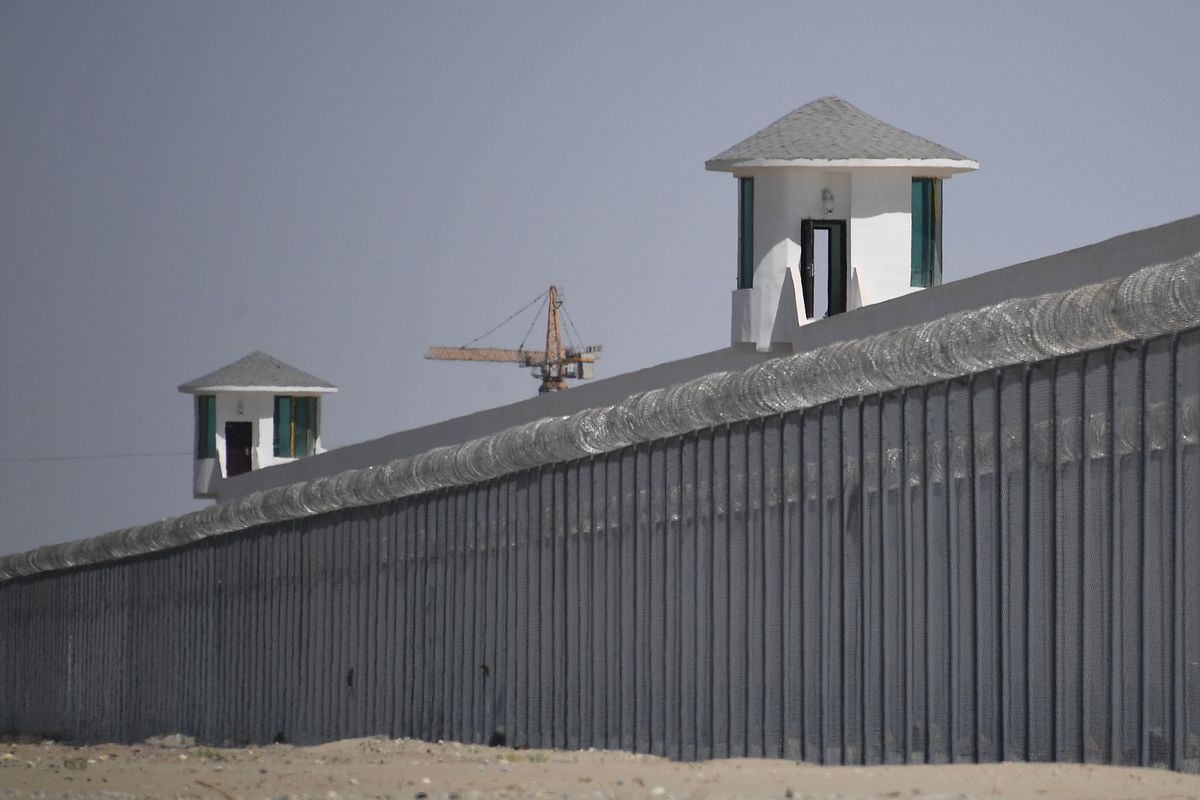[ad_1]
On March 24, the U.N. marks the International Day for the Right to the Truth Concerning Gross Human Rights Violations and for the Dignity of Victims. It is a day designated to honor the memory of victims of gross and systematic human rights violations and promote the importance of the right to truth and justice.
Any attempt to discover truth and preserve the dignity of victims will fail if survivors and witnesses are intimidated into silence. Similarly, this cannot be achieved if investigative journalists are prevented from investigating or censored. The case of the alleged atrocities against the Uyghurs demonstrates both concerning trends that ultimately affect the right to truth.

This photo taken on May 31, 2019, shows watchtowers on a high-security facility near what is … [+]
In February 2021, the BBC released a documentary about the use of rape and sexual violence against Uyghur women in camps in Xinjiang. In response, the Chinese Communist Party (CCP) banned the BBC. However, it then went further. As well as banning the BBC, the CCP attempted to discredit or pressure into silence any woman who dared to speak up. Reportedly, “Chinese officials have named women, disclosed what they say is private medical data and information on the women’s fertility, and accused some of having affairs and one of having a sexually transmitted disease. The officials said the information was evidence of bad character, invalidating the women’s accounts of abuse in Xinjiang.”
This is not the first attempt. Many witnesses and advocates have been subjected to intimidation and harassment. As Rahima Mahmut, human rights advocate and director of the World Uyghur Congress (U.K.) warned: “Today the [CCP] is carrying out a hidden campaign of threats and intimidation against British Uyghurs on our soil.” The U.K. Government appears to be aware of the issue. Indeed, in response to the written parliamentary questions of Afzal Khan M.P. on intimidation of witnesses, Nigel Adams M.P. responded that “[the U.K. Government is] aware of reports of members of the Uyghur diaspora – including in the U.K. – being harassed by the Chinese authorities in an effort to intimidate them into silence, force them to return to China, or co-opt them into providing information on other Uyghurs. The Government regards such activity as unacceptable and has raised our concerns directly with the Chinese Embassy in London. The FCDO continues to monitor the situation closely and we urge anyone affected in the UK to contact the police.”
This is highly concerning as such strategies may discourage survivors of such atrocities from speaking out. This is particular worrying as currently, there is no independent inquiry that can consider the atrocities, or a tribunal with the mandate to investigate the crimes. The International Criminal Court (ICC) does not have the territorial jurisdiction over the crimes allegedly perpetrated in Xinjiang. While there is an attempt to engage the ICC on the issue, this has not been successful yet.
The U.N. is not actively investigating the alleged atrocities. Recent attempts have been limited to calls for access to Xinjiang, which the CCP does not want to allow. There has been no attempt to establish a mechanism or mandate to investigate the situation. Indeed, the lack of access to the region should not prevent further inquires and certainly should not prevent the international community from taking steps to investigate the situation, collect and preserve the evidence. This could be done by establishing a U.N. General Assembly mechanism, akin to the IIIM for Syria or a fact-finding mission or commission of inquiry by the U.N. Human Rights Council. Such mechanisms, as were established for Syria and Myanmar, have been invaluable in collecting evidence of atrocities even where they were not allowed access to the countries.
As survivors, witnesses, human rights advocates and investigative journalists are being targeted for shedding light on the situation in Xinjiang, we need to do more to ensure that there are comprehensive investigative mechanisms in place. If we do not, we risk the possibility that this intimidation and harassment will silence them and as such, the truth will be silenced as well.
[ad_2]
